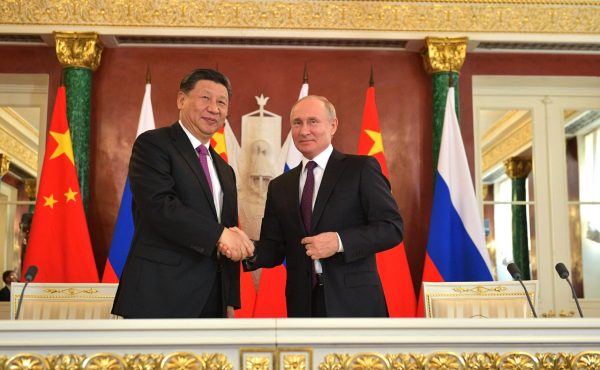This article was originally published on The Diplomat.
Xi might look at what has happened in Ukraine, and to the Russians, and think he’s got a reasonable shot at Taiwan.
Chinese leader Xi Jinping, like many people, may have been surprised by Russia’s failure to conquer Ukraine in a matter of days – owing in large measure to unexpectedly fierce Ukrainian resistance. In addition the Americans and the Europeans – even the Germans – imposing wide-ranging economic and financial sanctions on the Russians, and providing the Ukrainians with massive military aid must have surprised Beijing.
Indeed, some analysts suggested Putin’s difficulties with Ukraine might force Xi to decide an assault on Taiwan was too hard for the foreseeable future.
But now that four months have passed, Xi might look at what has happened in Ukraine, and to the Russians, and think he’s got a reasonable shot at Taiwan – and can absorb whatever punishment the U.S. and allies can apply.
From Beijing’s perspective, the question is whether the benefits are worth the costs. If the PRC conquers Taiwan, it would gain crucial strategic terrain. Taking Taiwan breaks the so-called “first island chain” that hems in Chinese forces, thus allowing China to push out from there and move freely south to the Philippines, Malaysia, and on, perhaps to its new friends in Solomon Islands – allowing Beijing to isolate Australia. To the north and east, China could make life very difficult for Japan, surround South Korea, and displace U.S. presence and influence.
All this would shatter U.S. strategic credibility. It would demonstrate that the United States could not protect 24 million free Taiwanese – despite U.S. military power, financial and economic power, and nuclear weapons. Who in the region (and world) will rely on U.S. promises after that? With the exceptions of Japan and maybe Australia, many countries in the region will try to cut what deals they can with the PRC. A PRC triumph on Taiwan would shift the strategic balance in Asia.
That’s an attractive upside for leaders in Beijing. So, looking at Ukraine from their point of view, how might the Chinese assess the potential U.S.- and Western-imposed costs of an attack on Taiwan?
Despite heavy casualties and equipment losses, Putin will likely end up with more of Ukraine than he started with. So much for him being forced out of office and Russia and the Russian military being “wrecked.”
The threat of being barred from SWIFT – and the inability to carry out U.S. dollar transactions – was supposed to be enough to deter Putin, or else make it impossible for Russia to prosecute the war for very long. That hasn’t happened yet. The Russian ruble is actually doing rather well.
It was a surprise to see how fast EU and many U.S. companies got on board with sanctions. These are making life harder in Russia. But from the start there were huge gaps in the sanctions regime. And Russia could make around $800 million a day just from selling gas and oil – some to Europe and a lot of it to India and China. The oligarchs show no sign of removing Putin.
War in Ukraine is not only benefiting Putin with higher prices for oil and commodities, but he now also controls a large proportion of global wheat production.
While Russia may not be winning, it doesn’t look like it’s losing either. And Beijing perhaps thinks it can handle the Western response even better than Moscow across a range of sectors.
Military Consequences
In Ukraine, the sheer military bulk of Russia might be winning out – even if slowly. The People’s Liberation Army has a similar or bigger overmatch on Taiwan.
U.S. aid to Ukraine has been considerable, but ultimately seems limited in quantity and type – and doesn’t include certain weapons that would be helpful. One reported reason was the fear that such weapons will be used over the border into Russia, and further “provoke” Moscow. Taiwan already doesn’t have enough of what it needs to defend itself. Would similar reasons about “not provoking Beijing” be used to keep it constrained, even in the event of a PRC invasion?
Remember, there are still no meaningful joint exercises and training between U.S. and Taiwanese forces. Taiwan remains outside of the RIMPAC exercise, the U.S.-hosted multinational maritime drills. At the end of day, this suggests the United States is not fully committed.
And, even if the United States and others do go “all in” after an attack starts, it might be too late. Unlike Ukraine, there is no land border with Taiwan to make it easy for the United States and others to resupply it and provide it with weapons. If the PRC can isolate Taiwan, it might just run out of missiles, ammo, and hardware, and resupply by the Americans and anyone else could be very difficult.
Also, pressure on the entire global economy from the Russia-Ukraine War is rattling everybody. Many countries are staying “uncommitted” on Ukraine, some are supportive of Russia, and Sri Lanka is even asking it openly for help. The Western bloc is powerful, but it’s also vastly outnumbered. The economic disruptions will be much worse over Taiwan and might make the world even more willing to let the PRC have its way.
Add to that, Russia’s threat of using nuclear weapons seems to have restrained the U.S. and EU response to the Ukraine invasion. Why wouldn’t the same be true for Taiwan? China has long claimed Taiwan as a “core interest” and the “bottom line” for its relationships with other countries. There’s every reason to believe nuclear-armed China would be willing to up the ante should its victory be threatened.
To read more, click here.


